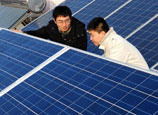
Even then, it took nearly four years for the company to start making glucosamine. "We rented laboratories and equipment for making the first batch of products, a few tons of glucosamine capsules, in 2009. Since then we have managed to make some profits," Lin says.
The lack of funds was such a pressing problem in the initial years that there was even an occasion when the company had just 10,000 yuan in its coffers, making it tough even to pay the salaries of employees.
The turning point came when a healthcare employee in Xiamen told Lin over lunch to get in touch with officials from the General Administration of Sport of China and seek their help to promote and sell the products.
"I decided to take his advice and left for Beijing a few hours later. I did not know anyone at the GASC then," Lin says.
Through the help of her former schoolmates, Lin managed to find a retired table tennis player and persuaded him to take the glucosamine capsules to combat osteoarthritis.
That move paid off and soon Lin became a well-known name on the sports circuit in China and had an ensemble list of athletes and several former footballers that were using her products. The company's products are now sold in more than 30 provinces and 200 cities across China.
Lin says she is now looking to take her company to even greater heights and increase production step by step as demand increases in China. Blue Bay has about 80 employees, who work in a 5,000-square-meter factory.
Luckily for Lin, the growth phase of her company coincided with the blue economy taking off in China.
With an eye on the future, the company plans to set up a new facility with an annual production capacity of 200 tons by 2014.

















 China's social trust index declined further last year, according to the Annual Report on Social Mentality of China 2012
China's social trust index declined further last year, according to the Annual Report on Social Mentality of China 2012


![]()
